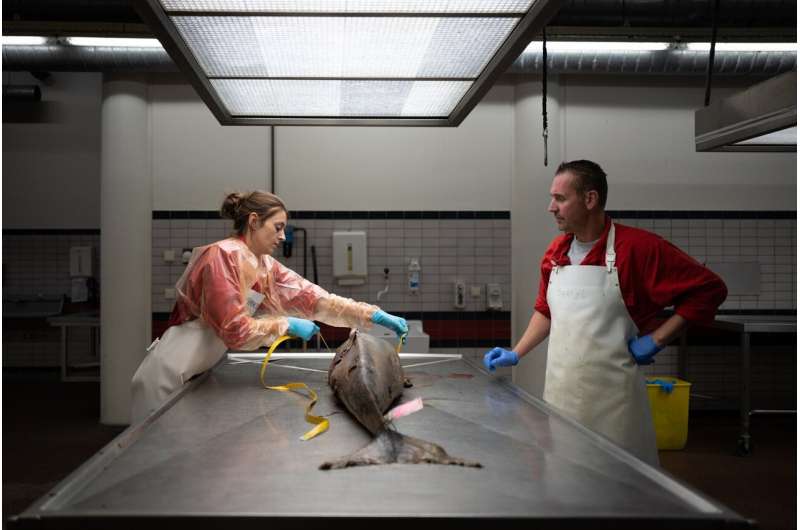Deadly bacteria found in large group of stranded porpoises

Last summer, some 190 dead porpoises washed ashore on the Dutch Wadden Sea Islands within just ten days. A remarkably high number, considering the annual average of about 600 stranded porpoises on the entire Dutch coast. During the past few months, researchers from Utrecht University and Wageningen University & Research—commissioned by the Ministry of Agriculture, Nature and Food Quality—investigated the possible cause of death of these porpoises. Their most remarkable finding is the presence of Erysipelothrix rhusiopathiae: a bacterium which can cause blood poisoning in cetaceans.
Sixteen of the 22 porpoises that were investigated were adult females. “All porpoises were in a similar state of decomposition. Therefore it is very likely that they died around the same time,” biologist Lonneke IJsseldijk of Utrecht University explains.
“A sudden death seems obvious”
The porpoises were examined for (among other things) their physical body condition, the presence of parasites, and blood samples were taken. This was followed by laboratory research into the contents of the stomachs and the presence of algae toxins and possibly lethal micro-organisms. This showed that in general, the porpoises were in reasonable to good health before they died. IJsseldijk says that “they had a healthy fat layer, relatively few parasites and many of the adult females had recently become pregnant. Therefore, a sudden death seems obvious.”
Empty stomachs
Despite their relatively good health, no prey remains were found in the stomachs of eleven porpoises. The others had only small amounts of food in their stomachs. “The animals involved in this mass stranding had therefore been starving for some time before they died”, says marine biologist Mardik Leopold of Wageningen University & Research. “This is consistent with a severe and acute illness.”
Blood poisoning
A particular strain of bacteria was found in over three quarters of the investigated porpoises: Erysipelothrix rhusiopathiae. These bacteria occur in almost all animal species and can cause Erysipeloid disease: an infection frequently seen with pigs and turkeys. The disease can also occur in reptiles, fish and humans. In the porpoises, the bacteria turned out to be present in multiple organs, indicating blood poisoning.
The porpoises might have been infected with Erysipelothrix via infected water, infected fish, or mutual transmission. If and how this has resulted in the deaths of the dozens of porpoises is unclear, according to IJsseldijk: “In the available literature there are no descriptions of mass mortality as a result of Erysipelothrix infection, only a few isolated individual cases. We also do not know if this bacterium normally occurs in porpoises. But the fact that until now, we have never found this bacterium in porpoises during an autopsy is certainly remarkable.”
Ruling out options
“All in all, we have been able to rule out many possible causes of death through this research,” Leopold says. “We can exclude sudden mass mortality from an underwater explosion, offshore wind farms, climate change or overfishing. However, special weather conditions may have contributed to the mass stranding of the animals, which must have died far out at sea.”
Nevertheless, there are still some open endings. Researchers from Erasmus University are still looking into the possible presence of viruses. And a low amount of saxitoxine (STX) was found in the porpoises: STX is a powerful biotoxin produced by algae that affects the functioning of the nervous system. Because of the poor condition of the stranded porpoises, it is still unclear what the STX concentration was just before death, and whether this concentration was high enough to have played a possible role in the mass mortality.
Food quality and health shown to be essential for successful porpoise reproduction
Thesis: www.globalacademicpress.com/eb … /lonneke_ijsseldijk/
Citation:
Deadly bacteria found in large group of stranded porpoises (2021, November 29)
retrieved 29 November 2021
from https://phys.org/news/2021-11-deadly-bacteria-large-group-stranded.html
This document is subject to copyright. Apart from any fair dealing for the purpose of private study or research, no
part may be reproduced without the written permission. The content is provided for information purposes only.
For all the latest Science News Click Here
For the latest news and updates, follow us on Google News.

